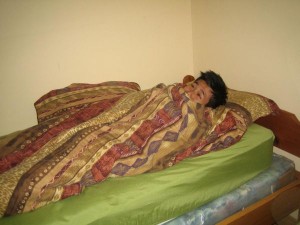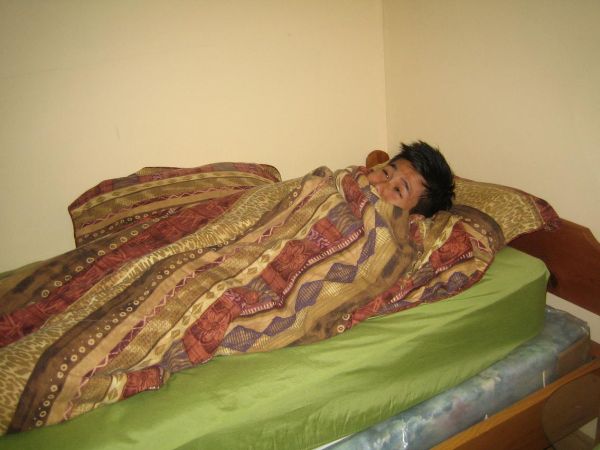
Treatment of common cold often involves treating the symptoms and alleviating any symptoms that may cause discomfort. Follow these tips:
- Make sure you drink lots of fluids. These include plenty of water, warm lemon water or clear broths. These fluids will compensate for the fluid being lost during fever and mucus production. Make sure you avoid diuretics such as caffeine and alcohol as they seriously lead to loss of fluids and dehydrating. You must also avoid smoking which can greatly exacerbate symptoms of colds.
- Get plenty of rest. If you are suffering from a cold, try to stay at home and avoid meeting with others as it will reduce the chances of you infecting others and allow you to rest as medications may cause you to become drowsy. If you are suffering from a cold, make sure you are wearing a mask so that you do not infect others in workplaces and any public area.
- Gargle with salt water. This is best for soothing your throat. About ¼ to ½ teaspoon of salt mixed with 8 ounces of warm water will make a good saltwater solution to relieve your throat pain and reduce soreness and itchiness of the throat.
- Consider using saline nasal drops. Over-the-counter nasal drops are highly safe and effective at alleviating your nasal congestion. Nasal drops can be used for children as well as they tend to be non-irritating and safe for all ages. For infants, you may fill one nostril will several drops of nasal solution and then gently suction the fluid through a bulb syringe. This should be ideally done before feeding as it can reduce discomfort while drinking from a bottle or nursing. You must also ensure that the procedure is carried out before sleep as it can allow the baby to sleep comfortably. You may use saline nasal sprays for older children.
- Have chicken soup. Chicken soup acts as an anti-inflammatory substance that inhibits the movement of the neutrophils. Thus, allowing them to respond to inflammation. Additionally, it also relieves congestion by loosening the mucus in the nose and reducing the time viruses spend in the nasal lining.
- Adjust your room’s temperature. Make sure your room is kept warm—but not too warm or overheated. Humidify your air using a vaporizer or cool-mist humidifier can moisten the dry air and relieve congestion and coughing. Keep the humidifier clean to prevent the growth of molds and bacteria
Prevention
The common cold can be caused by many different strains of viruses; therefore, a vaccine has not yet been developed to combat it. You can however, take come precautionary steps to reduce your risk of catching a cold:
- Wash your hands regularly. Make sure you teach your children to be careful and wash their hands regularly, especially after sneezing on their hands. Get used to using Sanitizers as well.
- Use tissues. Never sneeze into your hands. Make sure and your children sneeze or cough into tissues. Throw the tissue after it has been used and wash your hands properly. If you don’t have a tissue, sneeze on your elbow so that your hands are not involved.
- Scrub everything in your house. Make sure you scrub the floor, tiles and bathroom countertops and also keep your kitchen and house clean, especially when someone with a common cold leaves your house. It is a good idea to wash your children’s toys regularly.
- Do not share your personal items. These include glasses or other eating utensils with friends or family members. You can use disposable cups when someone is sick in your family. You can also label a cup with the person’s name so that only he uses it.
Related Training
To learn about severe situations relating to respiratory or breathing emergencies you can enrol in workplace approved first aid training to learn the latest techniques.
Related Video on Preventing a Cold
http://www.youtube.com/watch?v=YQ_1WvyCjYk

